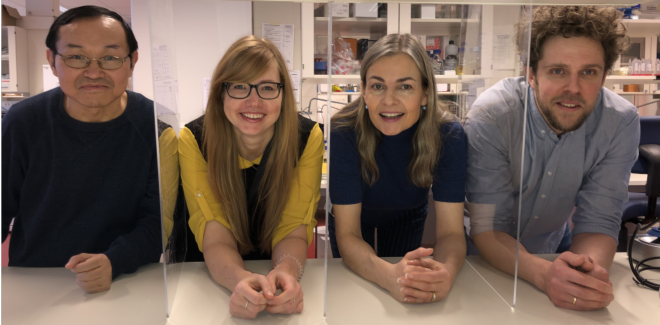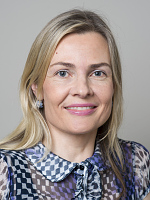Insight into cancer cells' own first aid could help the development of a new type of treatment. Johanna Olweus and her team at the UiO (University of Oslo) and the OUS (Oslo University Hospital) are important contributors to this study, which has been published in Nature.

The researcher team at UiO and OUS. From left: Weiwen Yang, Maarja Laos, Johanna Olweus and Morten Milek Nielsen. Photo: Cathrine Knetter Hoel.
Cancers such as malignant melanoma are notoriously difficult to treat. One of the reasons for this is the lack of good therapeutic targets, i.e. specific points for treatment to attack. Such points are ideally properties of the cancer cells that distinguish them from normal cells.
The most important aim for cancer cells is to grow and multiply. In order to do this they require nutrients, including amino acids that are the building blocks of proteins. If there is shortage of certain amino acids, this might cause a delayed cellular proliferation and growth of the tumour.
A new study shows a mechanism whereby tumours can overcome the obstacles that arise when they lack access to certain amino acids. This study has been published in one of the world's highest-ranking scientific journals; "Nature".
"The results of the study could be used to develop new immunotherapy. The reason for this is that they reveal a completely new class of therapeutic targets," says Professor Johanna Olweus.
"Starved" cancer cells create emergency proteins

"When cancer cells do not have access to sufficient nutrients they can create defective "emergency proteins" that they use so that they can continue to grow.
Such an emergency solution can promote the growth and aggressive behaviour of cancer cells.
The question posed by the researchers was whether or not cancer cells that create such "emergency proteins" could also be recognised as foreign by immune cells, so-called T cells.
"If we could get the T cells to kill those cancer cells that have created defective proteins, we could use this to develop new immunotherapy." says Olweus
The researchers wish to explore how their findings could be used for cancer immunotherapy
"Our role in this exciting project was to demonstrate that the defective proteins created by the cancer cells could be targeted by T-cells. We did this by using technology developed by our team," says Professor Olweus.
The researchers will now continue working together in order to explore the possibility of how these findings could be exploited in immunotherapy against cancer. Their method will involve identifying so-called T-cell receptors that recognise those cancer cells that create the defective proteins.
Professor Olweus's research team has already identified one such T-cell receptor from the immune cells of healthy blood donors. T-cell receptors can be used in gene therapy by genetically modifying the patient's own killer cells so that they are able to find those cancer cells that need to be killed. "The T-cell receptors are comparable to heat-seeking missiles", concludes Professor Olweus.
International cooperation
She has led the work carried out at the Oslo University Hospital and the University of Oslo, along with postdoctoral fellow Maarja Laos. Two additional researchers from her research team, Weiwen Yang and Morten Milek Nielsen, are co-authors of the study.
The initiative for conducting the study came from two research teams at the Netherlands Cancer Institute in Amsterdam and the Weizman Institute in Israel, respectively. These two teams made the discovery of the defective emergency proteins when they were conducting basic research. They then contacted Professor Olweus's research team to see if their findings could be used for the development of immunotherapy.






